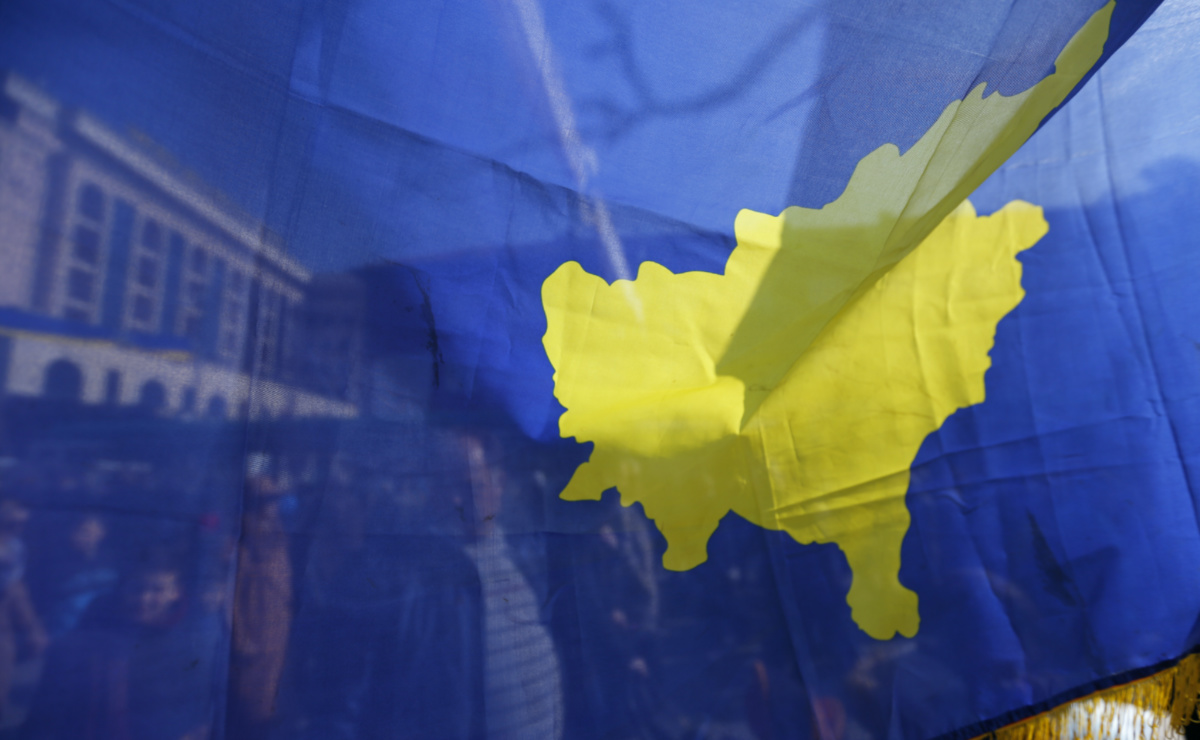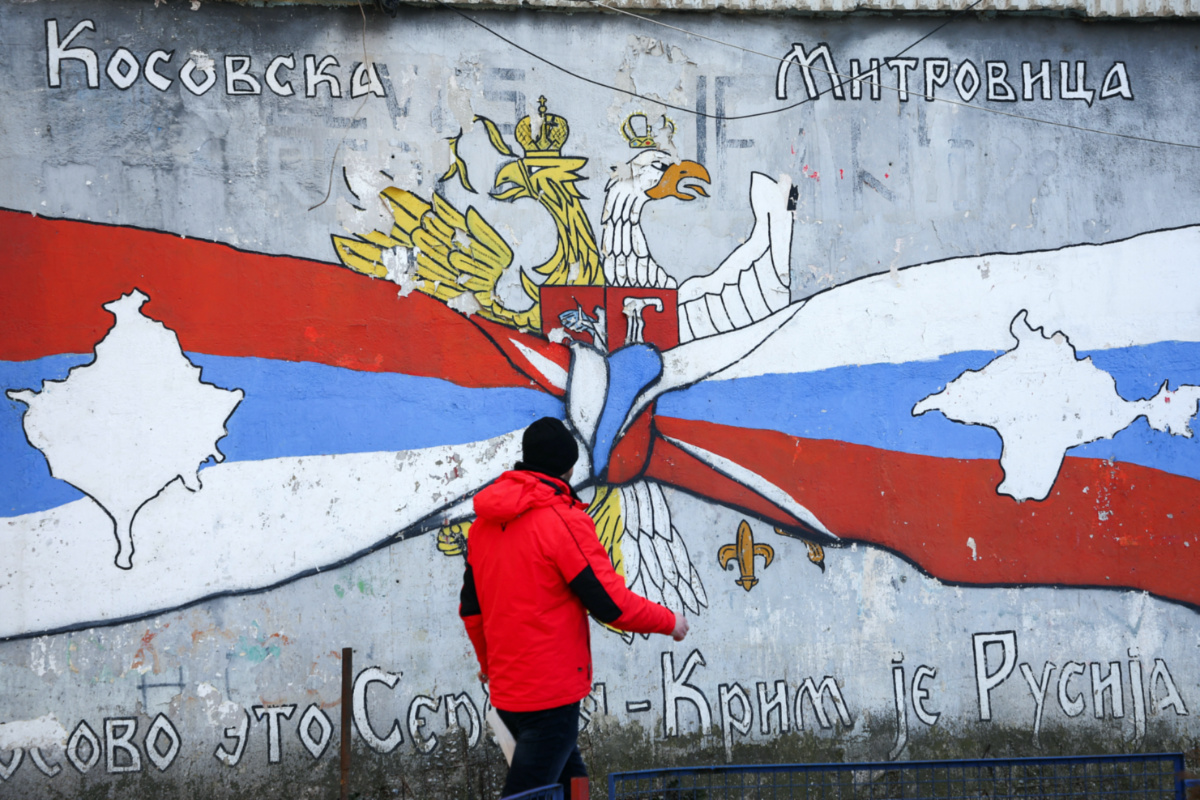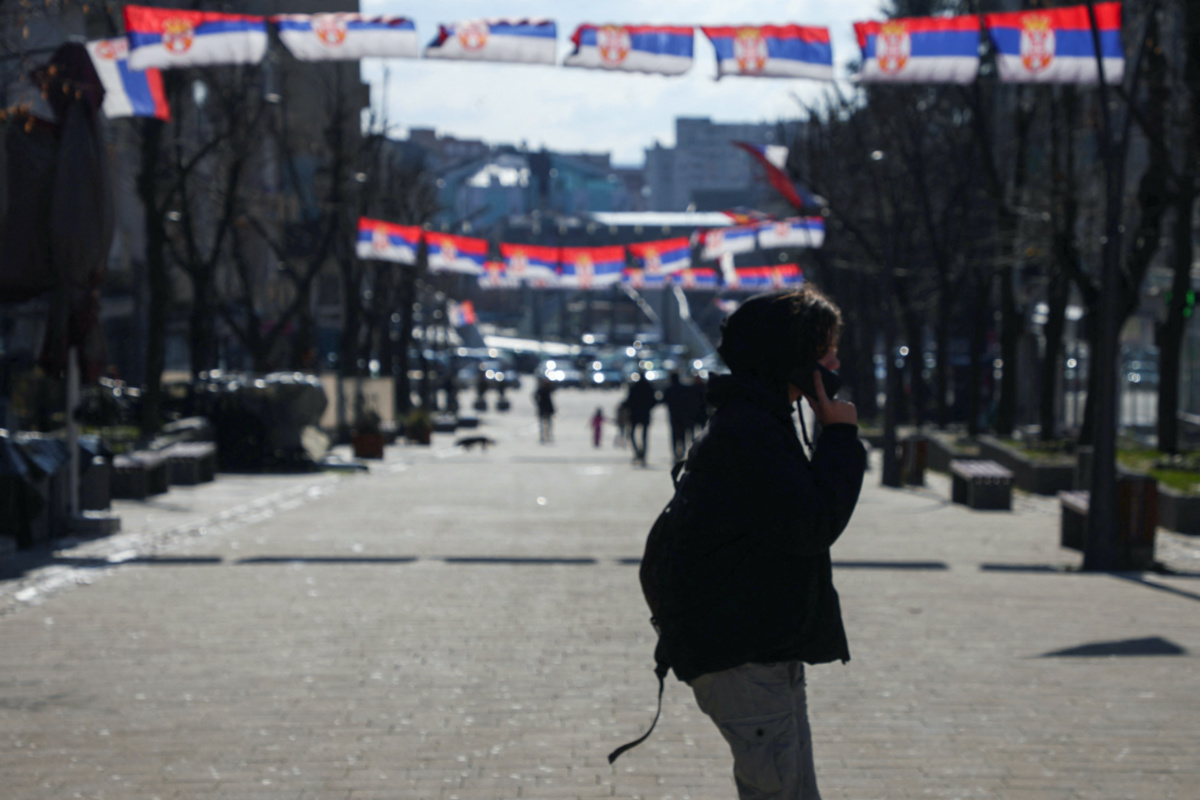
IVANA SEKULARAC and FATOS BYTYCI, of Reuters, report…
Pristina, Kosovo
Reuters
When in December Serbia put forces on highest combat alert in response to increasing violence in Kosovo between police and minority Serb protesters, a shareholder in Pristina’s newest shopping mall began getting calls from unnerved investors.
“International companies that were supposed to arrive for the first time in Kosovo told us that they were delaying opening shops due to the unstable situation,” Fatmir Zymberi told Reuters. “This meant for them Kosovo is a dangerous region.”

People are pictured through Kosovo flag as they take part in celebrations of the 10th anniversary of Kosovo’s independence in Pristina, Kosovo, on 17th February, 2018. PICTURE: Reuters/Ognen Teofilovski
Intense Western diplomacy halted a feared slide back into armed conflict in the run-up to the 15th anniversary on 17th February of ethnic Albanian-majority Kosovo’s independence from Serbia, the outcome of a 1998-99 guerrilla uprising.
But unresolved grievances continue to prevent normal neighbourly relations between Pristina and Belgrade. Western mediators see scant chances of a breakthrough soon with national leaders appearing disinclined to real compromise, at a time when Russia’s war on Ukraine has raised fears of regional turmoil.
The main, longstanding fount of tensions is the refusal of 50,000 ethnic Serbs in north Kosovo to recognise the government in Pristina or Kosovo as a separate country. They instead regard Belgrade as their capital, and Serbia’s constitution still treats Kosovo as an integral part of its territory.
The main, longstanding fount of tensions is the refusal of 50,000 ethnic Serbs in north Kosovo to recognise the government in Pristina or Kosovo as a separate country. They instead regard Belgrade as their capital, and Serbia’s constitution still treats Kosovo as an integral part of its territory.
The area of north Kosovo where ethnic Serbs form a majority looks in some respects like an extension of Serbia.
Teachers, doctors and public employees in the region receive their pay and benefits from Belgrade. Residents of Serb-majority municipalities do not pay taxes either to Belgrade or Pristina, or pay for energy provided by Kosovo’s state utility.
Serbian flags wave in the streets, murals proclaiming Kosovo to be an eternal part of Serbia can be seen on walls, and shops prefer the Serbian dinar to the euro used elsewhere in Kosovo.

A person walks past a graffiti in the northern part of the ethnically-divided town of Mitrovica, Kosovo, on 6th February, 2023. PICTURE: Reuters/Florion Goga
The stand-off has been the spark for numerous confrontations on the ground, with Serbs erecting barricades and clashing with Kosovo state police trying in vain to impose state authority.
When Pristina late last year acted to enforce a ruling that Serbs switch from Serbian car license plates – dating back to the 1990s – to those issued by Pristina, violence erupted with Serb protesters blocking roads and exchanging fire with police.
Border crossings were blocked. Serbia put its army on highest alert and asked the NATO peacekeeping force in Kosovo for clearance to send 1,000 troops there for the first time since 1999 – which NATO refused, while Pristina accused Belgrade of seeking to destabilise Kosovo with ally Russia’s help.
The Kremlin denied influencing Serbia to stir up conflict, saying Belgrade was just defending the rights of Kosovo Serbs.
After crisis mediation by European Union and US diplomats, and a Pristina agreement to put off enforcement of the car registration rules to late 2023, Serbia lifted its alert, barricades were dismantled and an edgy calm returned.
In mid-2022, the EU backed by Washington presented an 11-point peace and normalisation plan to the two sides. Last month, mediators urged them to accept it or face repercussions including loss of support for their EU membership bids.
As part of the plan, Serbia would stop lobbying against a Kosovo seat in global organisations like the United Nations, and Kosovo would create an association of semi-autonomous Serb-majority municipalities, tackling complaints of discrimination.
In early February, both Kosovo Prime Minister Albin Kurti and Serbian President Aleksandar Vucic hinted at readiness to approve the plan but said further negotiations would be needed.
EU foreign policy chief Josep Borrell said he would invite the two leaders to Brussels for meetings soon. But Vucic said he wanted a Serb municipalities group set up before such talks, while Kurti wanted them to address “international guarantees”.
“There is little hope this dialogue will actually get anywhere. The current government in Kosovo is made up of such hardliners that they even make Vucic look like a reasonable statesman,” a senior EU diplomat, speaking on condition of anonymity due to the fragility of the process, told Reuters.
“So Vucic can show he is engaging without much risk he would actually have to do hard things. It’s all bound to unravel on the Kosovo side first.”
Kosovo’s Constitutional Court has ruled that special, semi-autonomous status for Serbs would be unconstitutional, and Kurti says it would mean de facto ethnic partition of the small western Balkan state.

People cross a street in the northern part of the ethnically-divided town of Mitrovica, Kosovo, on 6th February, 2023. PICTURE: Reuters/Florion Goga
In 2013, following years of EU-brokered negotiations to defuse tensions, Serbs in the north took up jobs in the Kosovo police, judiciary and local administration run by Pristina.
But three months ago they left all state bodies in protest at Pristina’s crackdown on Serbian vehicle registrations.
Although the strife over that move has abated, “there are a lot of armed men around and tempers are short”, Marko Prelec, a Balkans analyst with the Brussels-based International Crisis Group thinktank, told Reuters.
“I am more worried than I have been in many years about the risk of conflict in north Kosovo that could then spill into reprisal attacks on Serbs in south Kosovo. There could be reprisal attacks on Albanians in the north [too].”
Another 50,000 Serbs live in Albanian-majority areas south, east and west of the northern flashpoint town of Mitrovica, and they drive cars with Kosovo license plates, pay Kosovo taxes and electricity bills, and recognise the independent state.
“I do not want to move, I want to stay here and live if our safety is granted,” Slavoljub Djuric, 62, who raises pigs and chicken on his family farm, one of 250 Serb households, in the western village of Osojane, told Reuters.
Djuric said Kosovo and Serb leaders should seek compromise. “Do something for the people so they can have [good] lives. War here has not brought anything good to anyone.”
We rely on our readers to fund Sight's work - become a financial supporter today!
For more information, head to our Subscriber's page.
Fifteen years into Kosovo’s independence, scores of UN member countries – including several in the EU with their own restive minorities – do not recognise its statehood, while Serbia and Russia continue to block Pristina from joining international organisations.
The degree of legal uncertainty and instability hanging over Kosovo has deterred many investors and left it among the poorest countries in Europe, with one third of its workforce unemployed.
Zymberi, the Pristina shopping mall shareholder, said that at the height of December’s tensions a foreign commercial bank indefinitely postponed a key £40 million loan to the centre.
“I tell Kosovo politicians to deal seriously and find a solution to this problem. We cannot live forever with it. The minimum they could do is avoid using the word ‘war’.”
From 2015-2019 some 170,000 Kosovars – 10 per cent of the population – left their homeland to seek better lives in Western Europe.
Economist Safet Gerxhaliu said Kosovo’s prospects were suffering from the lack of real peace with Belgrade and shaky rule of law. “We really have failed. And this failure today is being paid for by Kosovo citizens,” Gerxhaliu said.
– Additional reporting by GABRIELA BACZYNSKA in Brussels, Belgium.






